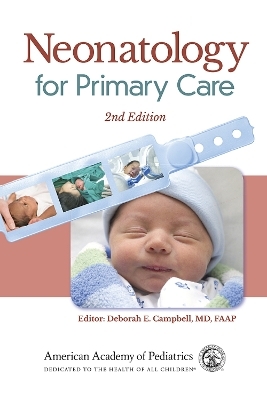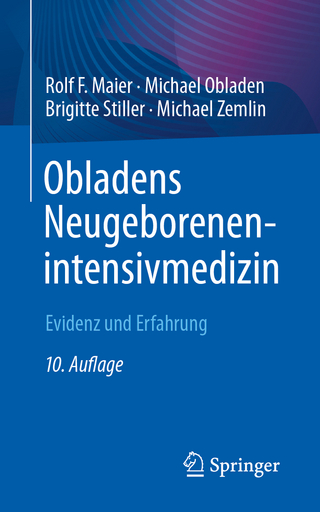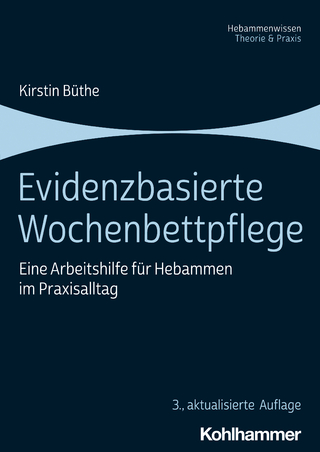
Neonatology for Primary Care
American Academy of Pediatrics (Verlag)
978-1-61002-224-8 (ISBN)
The revised and updated second edition covers practical approaches to caring for healthy and high-risk infants. The book covers maternal and fetal health, care of the newborn after delivery, breastfeeding, follow-up care, common congenital anomalies, the newborn with a heart murmur or cyanosis, neurologic findings, primary care issues relating to infants requiring intensive care, and health and developmental outcomes.
More than 40 chapters cover step-by-step recommendations on what to do, when to admit, and when to refer. Recommendations and lists detailed references within each chapter.
New in the second edition:
8 new chapters added including:
Prenatal Diagnosis
Fetal Interventions
Optimizing Nutrition for the Preterm, Very Low-Birth-Weight Infant After Discharge From Neonatal Intensive Care
Newborn Immunizations and Immune Prophylaxis
Balancing Safe Sleep and Other Newborn Recommendations
Vascular Anomalies
Endocrine Disorders Presenting in the Newborn Period
Shared Decision Making Around Home Technologies
Deborah Campbell, MD, FAAP, is Professor of Clinical Pediatrics and Associate Professor of Clinical Obstetrics & Gynecology and Women's Health at Albert Einstein College of Medicine, Program Director for the fellowship in Neonatal-Perinatal Medicine, and Director of the Division of Neonatology at the Children's Hospital at Montefiore. She conducts the Low birth weight infant Evaluation and Assessment Program (LEAP) and has served various leadership roles at the American Academy of Pediatrics, New York State Association of Regional Perinatal Programs and Networks, NYC Local Early Intervention Coordinating Council, and Greater New York March of Dimes Health Professionals Advisory Board and National March of Dimes.She is a member of the Greater New York Hospital Association Perinatal Safety Collaborative Advisory Group, the National Quality Forum Perinatal Collaborative, and the New York State Perinatal Quality Collaborative Neonatology Expert Workgroup. She also serves on the NYS Palliative Care Education and Training Council, an expert panel that has developed guidance and advice for the New York State Department of Health on best practices in pain management and end-of-life care. She served as a member on the AAP Taskforce on Implementation of Newborn Hearing Screening and the Early Hearing Detection and Intervention (EHDI) Program. She is currently co-chair of the Bright Futures Guidelines, 4th edition Infancy Expert Panel.
Part 1: Perinatal Health1. Perinatal Preventive Care: Fetal Assessment
2. Assisted Reproductive Technologies, Multiple Births, and Pregnancy Outcomes
3. Prenatal Diagnosis
4. Fetal Interventions
5. Maternal Depression
Part 2: Routine Care Issues
6. Medical-Legal Considerations in the Care of Newborns
7. Prenatal Pediatric Visit
8. Care of the Newborn After Delivery
9. Breastfeeding the Newborn
10. Optimizing Nutrition for the Preterm, Very Low-Birth-Weight Infant After Discharge From Neonatal Intensive Care
11. Newborn Immunizations and Immune Prophylaxis
12. Balancing Safe Sleep and Other Newborn Recommendations
13. The Circumcision Decision
14. Care of the Late Preterm and Early Term Infant
15. Hospital Discharge of the Healthy Term and Late Preterm Infant
16. Follow-up Care of the Healthy Newborn
Part 3: Assessment and Physical Examination of the Newborn
17. Maternal Medical History
18. Physical Examination of the Newborn
19. Neonatal Skin
20. Vascular Anomalies
21. Common Congenital Anomalies
22. Postnatal Assessment of Common Prenatal Sonographic Findings
Part 4: Neonatal Medical Conditions
23. Abnormalities of Fetal Growth
24. Neonatal Jaundice
25. Respiratory Distress and Breathing Disorders in the Newborn
26. The Newborn With a Heart Murmur or Cyanosis
27. The Newborn at Risk for Infection
28. The Newborn With Hematologic Abnormalities
29. Prenatal Drug Use: Neonatal Effects and the Drug Withdrawal Syndrome
30. Transient Metabolic Disturbances in the Newborn
31. Specific Congenital Metabolic Diseases
32. Endocrine Disorders Presenting in the Newborn Period
33. The Newborn With Neurologic Findings
34. Surgical Emergencies of the Chest and Abdomen in the Newborn
Part 5: Perinatal Care: Caring for the High-Risk Infant
35. Assessment and Stabilization at Delivery
36. Identifying the Newborn Who Requires Specialized Care
37. Care of the Sick or Premature Infant Before Transport
38. Continuing Care of the Infant After Transfer From Neonatal Intensive Care
39. Discharge Planning for the High-Risk Newborn Requiring Intensive Care
40. Follow-up Care of the Graduate From Neonatal Intensive Care
Part 6: Neonatal Outcomes
41. Health and Developmental Outcomes of Very Preterm and Very Low-Birth-Weight Infants
42. Health and Developmental Outcomes of Selected Medically Complex Neonates
Part 7: Supporting Families During Perinatal Illness and Death
43. Shared Decision Making Around Home Technologies
44. Support for Families Whose Infant Is Sick or Dying
| Erscheinungsdatum | 31.01.2020 |
|---|---|
| Verlagsort | Elk Grove Village |
| Sprache | englisch |
| Maße | 152 x 229 mm |
| Gewicht | 2160 g |
| Themenwelt | Medizin / Pharmazie ► Gesundheitsfachberufe ► Hebamme / Entbindungspfleger |
| Medizin / Pharmazie ► Medizinische Fachgebiete ► Pädiatrie | |
| Medizin / Pharmazie ► Pflege ► Kinderkrankenpflege | |
| ISBN-10 | 1-61002-224-6 / 1610022246 |
| ISBN-13 | 978-1-61002-224-8 / 9781610022248 |
| Zustand | Neuware |
| Haben Sie eine Frage zum Produkt? |
aus dem Bereich


